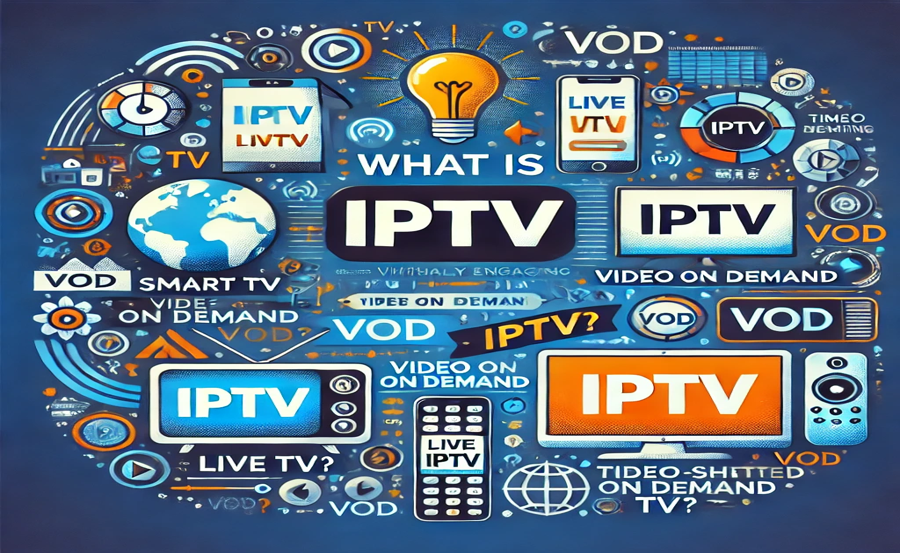IPTV (Internet Protocol Television) is a technology that delivers television content over the internet using Internet Protocol (IP) networks, rather than through traditional satellite, cable, or over-the-air methods. This allows users to stream media directly to their devices, such as smart TVs, computers, smartphones, and tablets, providing a highly flexible and customizable viewing experience. Unlike conventional broadcast methods, IPTV streams content in real-time or on-demand through a broadband connection, which offers several advantages in terms of convenience, cost, and access to content.
Buy 1 Year IPTV – Endless Entertainment
How IPTV Works:
IPTV operates by converting TV signals into data packets that are transmitted over the internet. These packets are delivered to an IPTV-compatible device (such as a smart TV or set-top box) that decodes the signal and allows the viewer to watch the content. The technology is similar to how websites and other internet-based services function, but with much higher bandwidth requirements to support the streaming of high-definition video content.
Types of IPTV Services:
- Live Television:
Live TV is similar to traditional television broadcasts, where you can watch TV channels in real-time as they are aired. IPTV enables this through internet streaming, providing a wide range of channels, including sports, news, and entertainment. - Video on Demand (VOD):
Video on Demand is a library of pre-recorded content that users can access whenever they want. It includes movies, series, documentaries, and special programs. Unlike traditional TV, there are no set schedules; users can start, pause, and stop the content at their convenience. - Time-Shifted TV:
This feature allows users to watch previously broadcasted content at their convenience. Time-shifted TV often includes catch-up TV, where users can view a show that was aired earlier, but they can rewind or fast-forward through it. It’s perfect for those who miss a live broadcast and want to catch up later. - Network Personal Video Recorder (nPVR):
IPTV systems often provide cloud-based personal video recorders, allowing users to record live content and store it in the network’s servers. This gives the flexibility to watch recorded shows anytime without the need for a physical recording device like a DVR.Mastering IPTV with Mag Box: A Step-by-Step Guide for Beginners - Interactive TV:
IPTV can offer interactive features like voting during live reality shows, choosing multiple camera angles during a sports event, or accessing other interactive media like video games.
Advantages of IPTV:
- Flexibility: IPTV is accessible on multiple devices, giving users the freedom to watch TV on their terms. Whether it’s on a large-screen TV, a computer, or a smartphone, IPTV ensures a seamless viewing experience.
- Cost-Effective: Many IPTV services offer a wider range of channels and on-demand content at lower prices compared to traditional cable or satellite TV services. Customers can often choose from different packages, allowing for greater customization based on preferences.
- Global Access: IPTV can provide access to content from around the world. Viewers can access international channels, foreign language content, and exclusive regional shows, which may not be available on traditional TV networks.
- High-Quality Streaming: IPTV can deliver high-definition (HD) and even ultra-high-definition (UHD) content, provided the user has a strong internet connection. Unlike traditional TV, IPTV streaming is not dependent on weather conditions (e.g., satellite interference).
- Interactive and Personalized Features: IPTV allows for user interaction, whether it’s choosing which episodes to watch, switching between different camera angles in sports broadcasts, or interacting with on-screen menus. Users can also customize playlists or access recommendations based on their viewing history.
How IPTV Differs from Traditional TV:
- Broadcast Method:
Traditional TV relies on radio waves, satellite signals, or cable to deliver content. In contrast, IPTV uses the internet, making it more adaptable to different devices and less reliant on specific geographic locations. - Content Delivery:
IPTV streams content in a packet-based method similar to other online data transmissions, allowing for faster and more efficient delivery. Traditional TV typically broadcasts signals simultaneously to all receivers, whereas IPTV transmits content to individual users on demand. - Interactivity:
IPTV is designed to be interactive, allowing users to search, pause, rewind, and customize their viewing experience. Traditional IPTV offers very limited interaction beyond flipping through channels. - On-Demand Viewing:
One of the biggest advantages of IPTV is the ability to watch content on demand. Traditional TV schedules programs, which viewers must watch in real time or record on DVR. IPTV allows users to access a vast catalog of content whenever they choose, including movies, shows, and special programming.
IPTV in Today’s Market:
The popularity of IPTV has exploded in recent years, particularly with the rise of streaming services such as Netflix, Hulu, and Amazon Prime, which are based on similar technology. However, IPTV goes beyond these services by offering live TV alongside on-demand options. IPTV also opens the door for smaller providers to offer niche content or regional programming that may not be available on global streaming platforms.
This growing demand for IPTV has led to a wide variety of providers, ranging from global companies to smaller, regional services. IPTV is also commonly used by businesses, hotels, and hospitals to provide customized content to their users or guests.VLC and IPTV: Unlocking Perfect Streaming in Just a Few Steps
Challenges with IPTV:
While IPTV offers many benefits, it is also dependent on a strong internet connection. Poor connectivity can result in buffering, lower video quality, or interruptions in service. Additionally, the legality of IPTV services varies by region, with some unauthorized providers offering access to copyrighted content without proper licenses, which has led to regulatory crackdowns in certain areas.
Conclusion:
IPTV represents the future of television, offering a flexible, personalized, and on-demand viewing experience. With its ability to stream live TV, provide interactive features, and cater to a global audience, IPTV has transformed how people access and enjoy media content. Whether you’re looking to cut the cord from traditional cable TV or simply want more control over your viewing experience, IPTV offers a modern solution tailored to the digital age.


